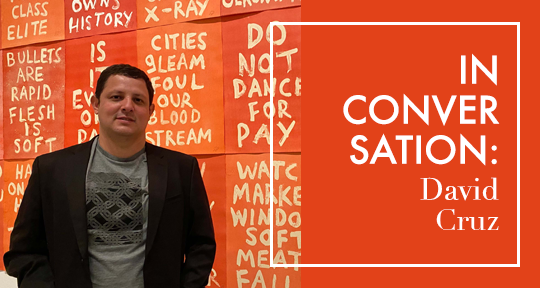Silvia Plath once wrote, “I have done it again. One year in every ten I manage it—”
This is the opening line of Lady Lazarus, a poem originally included in Plath’s second book, Ariel, published in 1965. Plath, the Bible’s Saint Lazarus, Ovid, David Bowie, Wisława Szymborska, Federico García Lorca, and others sat next to Costa Rican poet David Cruz, or so he claims, as he was writing—and “rigorously editing”—his latest book of poems, Lazarus. This is David’s third book of poems and a follow-up to his 2017 She likes to cry while listening to The Beatles (Valparaíso Ediciones). Earlier this year, Lazarus won the Manuel Acuña Poetry Prize (PIMAPLE in Spanish); previous winners include Antonio Gamoneda, Juan Malibran, and Isabel Conejo.
Lazarus is a retelling of the myth of Saint Lazarus and Plath’s Lady Lazarus. It’s also, says David, “a game of dualities”: past and present, life and death; and an homage to “voices from the past.”
David Cruz is one of Central America’s most exciting poets working today. His poetry is a force of nature. Stunning, picturesque, exquisite. Devastating, earth-shattering, dense. Divine, esoteric, spiritual, mythological, and personal, too. In 2015, more than two hundred critics from universities such as Harvard, Oxford, Columbia, and Princeton chose forty Spanish-speaking poets, born between 1970 and 1985, who, they believed, were “the most relevant” at that moment. They called them El canon abierto—The open canon. The list includes authors such as Andrés Neuman, Urayoán Noel, Raquel Lanseros, and David Cruz. The few glimpses we’ve seen of Lazarus in Vislumbre and available here (PIMAPLE asked David not to share the book just yet) are a testament of such power and “relevance.”
Lazarus I
The mind is a multidimensional map.
Everything we see is but the tip of the iceberg.
I go to the basement of my head
and find many lives,
many memories that I have not lived.
Now I understand Vallejo
“I will die in Paris with the downpour,
on a day I already remember.”
David has published three books of poetry, and in 2011, he won the prestigious Luis Cardoza y Aragón Poetry Prize for his collection Trasatlántico. He’s currently completing a Ph.D. in Hispanic Studies at the University of Washington in Seattle.
José Garcia Escobar (JGE): The last book you put out before Lazarus was She likes to cry while listening to The Beatles in 2017—originally in Spanish, in 2013. What type of literary concerns (or, to put it differently, what “ideas to write about”) did you have then, and what happened to them?
David Cruz (DC): My last book was a personal interpretation of the social, cultural, and technological shifts we experienced between the second half of the twentieth century and the beginning of the twenty-first century. My poetic self in that book gazed at a girl, and I gazed at the world through her. It’s a book nourished by many things such as music (The Beatles, naturally, is the book’s motif), daily news, artists’ ego, politics; I wanted to abridge many ideas under a clear and organic structure. And these are ideas that are still in my head, that remain, and they come to life every time someone reads the book.
TRACK 1
Music is a cavern of sounds
that resists oblivion.
Notes stretched out in bars.
Shallow vaults where the ships run aground.
Clouds in the depths of the universe
that at the point of impact with the rocks, plagiarize
their own interpretation. READ MORE…




